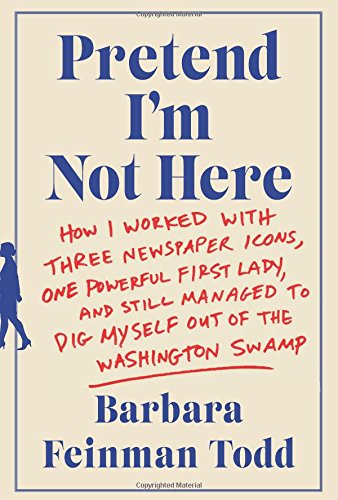 When I was a junior in college I lived in Florence, Italy, and studied literature with profesor Dennis Todd, who lived on campus with his wife, Barbara Feinman Todd, along with their adorable and spunky daughter Sasha. Getting to know and hang out with Barbara was one of the unexpected bonuses of living in Italy for a year. She was sincerely fun to hang out with, whether grabbing pizza in Fiesole or going shopping for the exact right pair of Italian loafers, but a bonus for me was that she was a journalist, so I looked to her as a writing mentor. An especially intriguing item on her resume was her experience as a ghostwriter: she was the ghostwriter behind Hillary Clinton's It Takes a Village and it turned out that Clinton declined to acknowledge Feinman for her efforts. This was back during a time of my life where I was relatively anti-Hillary for reasons that are irrelevant and outdated now. I remember that Clinton actually came to Fiesole for some event and we were all a little piqued by the unlikely possibility that Barbara and Hillary would run into each other.
When I was a junior in college I lived in Florence, Italy, and studied literature with profesor Dennis Todd, who lived on campus with his wife, Barbara Feinman Todd, along with their adorable and spunky daughter Sasha. Getting to know and hang out with Barbara was one of the unexpected bonuses of living in Italy for a year. She was sincerely fun to hang out with, whether grabbing pizza in Fiesole or going shopping for the exact right pair of Italian loafers, but a bonus for me was that she was a journalist, so I looked to her as a writing mentor. An especially intriguing item on her resume was her experience as a ghostwriter: she was the ghostwriter behind Hillary Clinton's It Takes a Village and it turned out that Clinton declined to acknowledge Feinman for her efforts. This was back during a time of my life where I was relatively anti-Hillary for reasons that are irrelevant and outdated now. I remember that Clinton actually came to Fiesole for some event and we were all a little piqued by the unlikely possibility that Barbara and Hillary would run into each other.
Now, Barbara has published a book about her experiences as a ghostwriter and researcher for Clinton as well as Bob Woodward, Carl Bernstein, Ben Bradlee and more. If you are or aspire to be a journalist, ghostwriter, or are just all about the muck of the proverbial (and incorrectly labeled) DC swamp, you should check out Pretend I'm Not Here: How I Worked with Three Newspaper Icons, One Powerful First Lady, and Still Managed to Dig Myself Out of the Washington Swamp.
It was especially interesting to me because I've been contemplating trying my hand at ghostwriting, but Feinman's book made me second-guess that option. While an access to celebrity sounds tempting, it also comes with the price of muffling your own literary or journalistic voice, of getting subsumed by the big personality you're there to distill into words.
Pretend I'm Not Here is also a good read right now because it made me ponder the nature of journalism -- are Feinman's tales from the Washington Post's offices reflecting a bygone era, or are they more relevant than ever? She also compares her own dimunutive, self-effacing self to those of the big brass-ball male journos she often worked alongside. On the one hand, there is a journalistic upside to literally convincing people to pretend you're not there, but I know she probably wouldn't tell her journalism students, especially her female ones, to copy that tack.
Aside from the dirt and the career advice (and cautionary tales), I enjoyed reading Barbara's book--she's still the sly, funny, dry and smart woman I had fun spending time with at Georgetown. Pick it up now if you want to read something that's timely and relevant but not so timely and relevant it's depressing.
